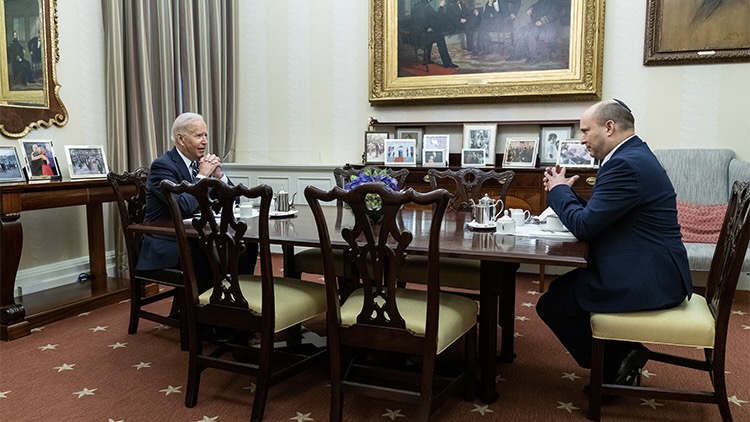For a very long time, the US policy vis-a-vis Iran has been guided by the interests of its regional allies. The US’ closest ally Israel, sees Iran as a challenger to its military hegemony and occupation of Palestinian and Syrian lands. Israel naturally would want to keep Iran down by any means possible. The economic warfare waged by the US through sanctions plays a very crucial role in meeting this objective. This orients Israel’s opposition to the revival of the nuclear deal.
Israel had already had serious objections to the deal when it was first signed under the Barack Obama administration in 2015. The deal was termed by The New York Times (NYT) a result of a long struggle between the US and Israel. The then prime minister of Israel, Benjamin Netanyahu, had called it a “historic mistake” because it allowed Iran to become a legitimate player in world politics without UN sanctions for the first time since the revolution in 1979. There was a consensus view in Israel, with opposition leader Avigdor Lieberman claiming the deal to be “an agreement of total capitulation to unrestrained terrorism and violence in the International arena.”
A fake narrative of self-defense was created around Iran’s nuclear program by Israel. In order to break what is perhaps the last major regional support base to Palestinians, Israel need a weak Iran.
The phantom of Iran’s nuclear program
Iran’s top leader Ayatollah Khamenei had ruled that the nuclear bomb is “un-Islamic” and its nuclear program is for “civilian purposes” only, but Israel refuses to accept the Iranian claim. It has carried out numerous attacks, mostly unclaimed, on Iran’s nuclear facilities. As per Iran, Israel had a role in the assassination of some of its top nuclear scientists, including Mohsen Fakhrizadeh.
These provocative acts were carried out despite the Joint Comprehensive Plan of Action (JCPOA) allowing Iran’s nuclear program to continue under strict international supervision. Israel, however, did not trust its ally the US and the international monitors provided for in the deal, and threatened to carry out an attack along the lines of Osirak (Iraq 1981) if the deal was revived.
Netanyahu, who played an important role in convincing Trump to unilaterally withdraw from the JCPOA in May 2018 and reimpose the sanctions on Iran which were waived following the deal in 2015, has claimed that, “this [revived] agreement is even worse than its predecessor, because in three years time, under this agreement, Iran will be a threshold nuclear state. It will have enough enriched uranium to create dozens and dozens of nuclear bombs and it will have the ICBMs (Intercontinental ballistic missiles] to deliver them to any place in United States.”
The reason behind the consistent opposition to the deal as Jonathan Cook had argued, may go beyond what they are willing to say. For Cook, the real consequences [of a real deal with Iran] “would likely be felt most acutely by Israel in its conflict with Palestinians” and in its regional standing.
Iran as a challenger
Israel’s objections to JCPOA is not limited to Iran’s nuclear program only. It opposes any integration of Iran in the international economy claiming that it will use its economic prosperity to buy advanced weapons and strengthen its regional presence. In some ways it wants to keep Iran a pariah state until it completely surrenders its foreign policy to the US like most of the Gulf countries. It’s an attempt to decimate all challengers to its regional hegemony.
Israel knows Iran will never agree to do so. Ayatollah Khamenei only last week asserted that Iran will never give up its “regional presence” and “peaceful nuclear program”. “It is vital for any country to have national power” and “regional presence gives us more strategic depth and national strength. Why should we give it up?” he asked.
Even at the cost of risking his relations with the then President Barack Obama, Netanyahu had openly criticized his negotiations with Iran in 2015. He and his successor Naftali Bennett have reiterated that lifting of sanctions will strengthen Iran and the money it will get from international trade of oil and gas will be used to sponsor “international terrorism”.
For Israel, Iranian support to Hamas and Hezbollah amounts to “financing international terrorism” because they resist its occupation. Iran’s support to the Syrian government during the war is propagated as building an anti-Israel alliance. Syria is bombed every week since 2011 by Israel on the pretext of Iranian presence there while Americans are busy winning Arab allies for it through the so-called Abraham Accords.
Biden and Israel
When Israel was bombing Gaza last year, Joe Biden had said, “until the region says unequivocally they acknowledge the right of Israel to exist as an independent Jewish state, there will be no peace.” Among all the major countries in the region perhaps Iran and Syria are the only two countries who have refused such hegemonic demands so far. The battle line is clearly demarcated.
As Seif Da’na, a professor in Wisconsin-Parkside had written in AlJazeera in 2015, Israel uses “common imperial tactics of Psychopathologizing Iran and Arab resistance leaders. The real targets are ‘Iranian policies’, ‘behavior’ and ‘state.’”
The fact that Biden, despite promising a quick revival of the deal, has already taken more than a year and has not reversed Trump’s disastrous sanctions on Iran indicates the deep impact of Israel on US foreign policy in West Asia.
The talks in Vienna have been halted and hopes of a quick revival of the Iran nuclear deal are faded once again. The eighth round of talks had concluded for all practical purposes last month as Iranians have claimed, they were waiting for the US to take the final call on lifting sanctions. Russians seeking some kind of sanctions waiver from Biden on its relations with Iran is most likely the reason for the present halt. Nevertheless, Israel will be celebrating.





